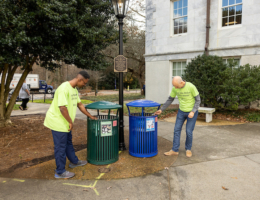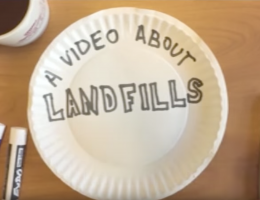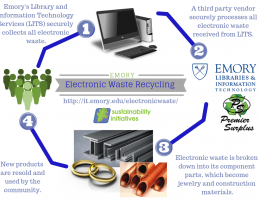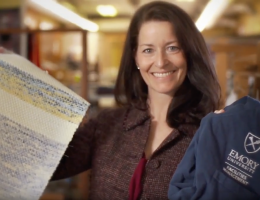Zero Landfill Waste Highlights
An average American generates about 4.9 pounds of landfill waste every day. Emory encourages all members of its community to reduce the amount of waste sent to landfills – and Emory University is leading a multitude of efforts designed to support that goal.
The Emory Waste Policy was rolled out in January 2018 to guide campus waste management changes. Designed to achieve our 2025 goals for waste reduction and diversion, this extensive program offers convenient recycling and composting stations across campus and clear instructions to enable the entire campus community to eliminate landfill waste.
Emory’s Sustainability Vision & Strategic Plan, 2025 includes the goal to divert 95% of non-construction campus waste from municipal landfills by that year.
According to Emory Recycles, from September 2018 to August 2019, the campus collectively diverted about 72.36% of its total waste from landfills – an over 13% increase from the 59% diverted in 2017, before the new waste policy was adopted.
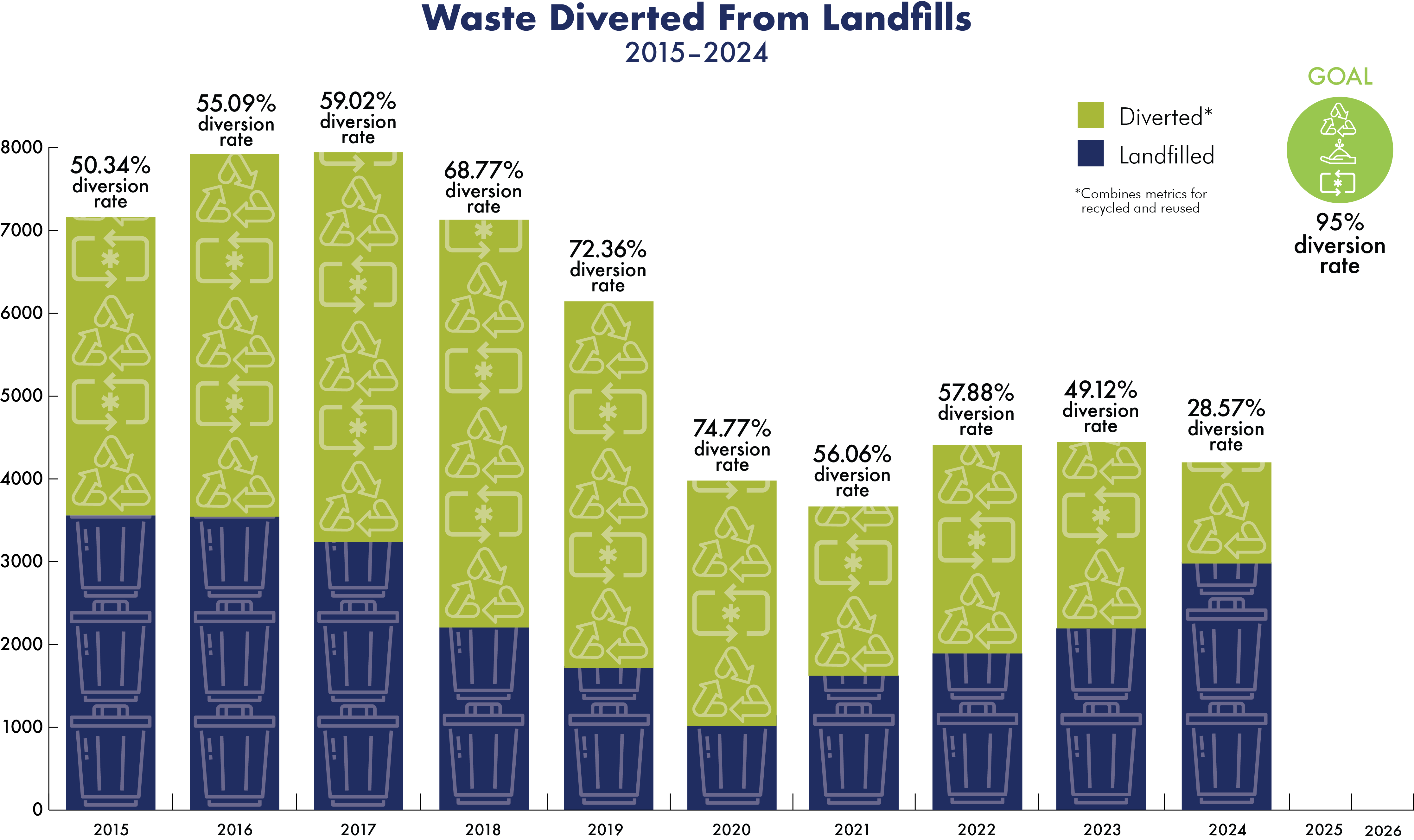 Click image for a larger view
Click image for a larger view
Zero Landfill Waste Benefits
By recycling and composting at Emory, we reduce greenhouse gas emissions from landfills, reduce the negative effects of landfills on already marginalized populations, and decrease habitat loss and animal displacement due to landfills. Recycling conserves natural resources, increases economic security, prevents pollution, and helps create jobs in the community.
Emory University deeply values sustainability, and we are embracing the opportunity for our entire community to develop habits that will encourage lifelong sustainable living. The Zero Waste Ambassadors program advances these goals, training students and staff from across Emory to educate the community about proper materials management. Ambassadors champion the zero-waste lifestyle and help to engage others on campus to do the same. If you are interested in becoming an ambassador, you can apply here!
Waste is broken into specific streams to optimize revenue that can be realized from recyclables.
How It Works
All major University buildings are equipped with five standardized bins to collect the following commodities:
- Compost
- Plastics and Metals
- Mixed Paper
- White Paper
- Landfill
Exterior bins have been standardized to provide two collection streams: compost and mixed recycling. There are designated collection areas in most major buildings for hard-to-recycle materials – glass, packaging Styrofoam, batteries, light bulbs, ink and toner cartridges, and aerosol cans.
The servicing of desk-side waste or recycling bins by Campus Services’ staff has been discontinued. While Emory staff and faculty may keep a bin or other container at their desk, they will individually transport their disposables to central collection areas.
All University events will be zero landfill waste events and free from disposable plastic water bottles by 2025, unless granted an exception by the Executive Vice President for Business and Administration.
Frequently Asked Questions about Waste Reduction, Recycling, Composting and Landfill Waste at Emory University
Waste Policy Basics
What is Emory’s Waste Policy?
Emory’s 2025 Sustainability Vision set the goal to divert 95% of waste from landfills, and in 2016 Emory hired national experts to help develop a plan to achieve this goal. These experts recommended all units of Emory University, including Oxford College, remove servicing of desk-side waste bins, add more uniform sets of recycle and compost bins in convenient interior spaces, and remove landfill as an option for outdoor spaces. The Emory Waste Policy was developed by Emory’s Waste Think Thank, made up of experts in a variety of Emory departments, and is supported by the President’s Leadership Council, the University Senate, and unit Deans. The policy is jointly implemented by Campus Services and the Office of Sustainability Initiatives.
Why did Emory adopt this program?
Emory’s Zero Landfill Waste initiative seeks to reduce the harmful environmental, social, and economic impacts of landfills. In addition to the methane produced by landfills–a powerful greenhouse gas–metro Atlanta landfills pose threats to human health, particularly for surrounding communities. Pollution from frequent trucks affect air quality and increases the risk for respiratory-related illnesses, harmful wastes can find their way into the groundwater and drinking water, and landfills generate odor, vermin, noise, and lowered property values. These issues disproportionately impact the historically disadvantaged communities in which landfills are located. Emory’s goal to divert 95% of waste from landfills by 2025 reduces these environmental and social harms.
Is this program affecting all buildings at Emory University?
Yes. All University buildings on Emory’s Druid Hills campus, Oxford campus, and Grady that are currently serviced by Campus Services are equipped with standard recycle and compost bins, and desk-side waste service ended in January 2018.
Are Emory research and teaching labs a part of the waste policy?
All University buildings with laboratories have standard collection stations in laboratory hallways, common rooms, and break areas, with the addition of at least one glass recycling bin on each floor. Labs should self-service recyclable materials from inside labs into convenient collection stations outside the lab in the hall. In 2019, recycling inside of laboratories was rolled out. Custodians service landfill bins inside of laboratories; however, we encourage laboratories to reduce the number of landfill bins and use them only for materials that cannot be recycled or composted, such as ice packs, Pyrex glass, and nonhazardous gloves. All labs dispose of regulated materials in the same manner as always, as enforced by Emory’s Environmental Health and Safety Office. However, some materials previously destined for landfill bins are now recyclable. Please consult the detailed Lab Recycling Process Map and this blog on Laboratory Landfill Diversion for more information.
Are Emory spaces at Executive Park a part of the Waste Policy?
At this time, Executive Park does not participate in the Waste Policy.
Are Emory Healthcare spaces a part of the Waste Policy?
This Waste Policy applies to Emory University spaces only. The Emory Sustainability Vision sets a goal of 37% landfill diversion by 2025 for Emory Healthcare spaces. Emory Healthcare is implementing various landfill diversion programs in its facilities, and may adopt this or a similar policy in the future.
How can I plan events that comply with Emory’s Waste Policy and support our Zero Landfill Waste by 2025 goal?
Emory’s Certified Sustainable Events program outlines ways to plan Zero Landfill Waste events at Emory and gives certification and recognition to event planners and departments that participate. Events catered by Emory Catering are always Zero Landfill Waste. When using America to Go caterers, look for the Zero Landfill Waste icon next to caterers that support Emory’s Zero Landfill Waste program by providing and serving materials that are compostable or recyclable at Emory.
How can I request a presentation to my department, lab, or office?
Contact Emory’s Office of Sustainability Initiatives at emorysustainability@emory.edu to request a presentation to your department, office or lab.
Where should I go or whom should I ask if I have more questions about recycling/composting at Emory?
For questions about bins and operational issues such as waste, recycling, and compost collection, contact Emory Auxiliary Services at 404.727.9275 or at recycling@emory.edu. For questions regarding the Policy or sustainability goals and initiatives, contact Emory’s Office of Sustainability Initiatives at 404.727.9916 or at emorysustainability@emory.edu.
How is outreach and education about the Zero Landfill Waste Policy and goals shared with the Emory community?
Emory Zero Waste Ambassadors are Emory community members who are committed to promoting a post-landfill future that takes into account the health and well-being of surrounding communities and future generations. The Zero Waste Ambassadors hold outreach and education programs throughout the University. Emory’s Sustainability Representatives lead outreach and education efforts on Emory’s Zero Landfill Waste initiative. They represent every major building on campus and many major departments. Find your building’s Sustainability Representative to seek ways to be involved in sustainability at your department or building level.
How do we know that the program is working?
Emory measures and tracks its waste monthly and reports diversion rates quarterly and annually. More information can be found on the Emory Recycles Website.
How can I get more involved in sustainability at Emory?
Explore the Office of Sustainability Initiatives website to learn more about our work and how to get involved. Sign up for the Emory Office of Sustainability Initiatives weekly newsletter to stay informed and learn how to get involved.
Five-Bin Waste Streams and Sorting
What are the five waste streams?
The five waste streams are compost, plastics and metals, mixed paper, white paper, and landfill.
- Compost: All food, napkins, compostable utensils, paper cups, and paper food containers
- Plastics and Metals: All metal cans, foil, plastic bottles, snack wrappers, plastic bags & wrap, and most office supplies
- Mixed paper: All non-food related paper including cardboard
- White paper: white printer paper and notebook paper
- Landfill: Only disposable PPE and food-grade styrofoam
Almost all materials can be recycled or composted at Emory. The materials that can be sorted into campus blue recycling bins are different than materials most people can recycle through residential programs. Emory’s recycling stream is informed by the processes and capabilities of local recyclers to separate materials for reuse. These vendors often are not the same local or regional recyclers used by municipal residential recycling programs. Download Emory’s waste sorting brochure to learn which materials should be placed in which bins.
Who services the waste in common areas of buildings, such as kitchens, conference rooms, and lobbies?
Emory’s Campus Services staff services all waste bins that are not desk-side, including recycle, compost, and landfill materials placed throughout the building and in common areas. These bins are serviced daily for landfill and compost materials and as needed for recycle materials. Notice: You can report bins that need to be serviced by contacting Emory Auxiliary Services at 404.727.9275 or recycling@emory.edu.
How should we sort waste in conference rooms?
Emory’s Zero Landfill Waste goals apply to all conference rooms. Large conference rooms with 25 seats or more may have five standard bins for recycle, compost, and landfill, located within the conference space. If spaces do not allow for the five standard bins, a dual-stream set-up with compost and recycle bins is installed, or a five standard bin set is located conveniently outside the room. Small conference rooms with fewer than 25 seats have signage directing occupants to convenient collection stations where five standard bins are located. Conference room occupants are responsible for sorting their own waste into compost and recycle bins.
What happens if a room is too small to hold all 5 bins for recycle, compost, and landfill?
Some small rooms cannot accommodate all five bins, and in this case either no bins are present, or a dual-stream set-up is installed. These dual-stream set-ups include a compost bin and a recycle bin where all recyclables are placed together. Dual stream set-ups do not include a landfill bin. Custodial staff service waste from small rooms that contain dual-stream bins.
What type of bins will be placed in small copy rooms and mail rooms?
If copy rooms and mail rooms are too small to hold the five standard bins, a dual-stream recycle set-up of white paper and mixed paper is installed. Dual-streams set-ups do not include a landfill bin. Custodial staff are responsible for servicing waste from small copy and mail rooms that contain dual-stream bins.
What is proper protocol for large office cleanouts?
Contact Campus Services Customer Service at 404.727.7463 or cscsc@emory.edu to submit a request to have large bins delivered and serviced rather than overloading the interior bins.
How should we sort waste in restrooms?
Restroom waste consists primarily of paper towels, therefore landfill bins are not present in restrooms. All paper towels and used tissues go into the green compost bin. Personal hygiene waste should be placed in the designated boxes in bathroom stalls. Medical waste such as needles should be taken home or placed into red regulated waste bins. Campus Services custodial staff is responsible for servicing waste from restrooms. If your bathroom needs any of these bins, please contact Campus Services Customer Service at 404.727.7463 or cscsc@emory.edu.
What type of bins are placed in classrooms, and who is responsible for servicing classroom bins?
Classrooms may contain five standard bins, or they may contain dual-stream bins for recycle and compost, or they may not have bins at all, depending on the needs of the building. Students are expected to bring their waste to the nearest standard waste station, whether in the classroom or in a convenient location outside the classroom. Custodians service these bins.
How can I get a set of new recycle and compost bins for my building?
Emory Campus Services provides new and retrofitted equipment, labels, and signs for all Emory buildings and works with building occupants to determine the convenient locations for the placement of interior bins. Exterior bins were replaced from late fall 2017 to early winter 2018 by Campus Services.
Can I get a compost bin for my office?
No. All University buildings are provided with standardized bins in convenient locations throughout the building, which includes a compost bin. Compost bins are not provided to individual offices. You may keep a small container at your desk for compostable items if you choose, but no desk-side containers will be serviced by Campus Services staff.
Why does Emory compost food waste from kitchens, events, consumer leftovers, and paper towels, in addition to animal bedding from research labs?
The results of the 2015-2016 audit of Emory’s waste streams by external consultants show that 67% of Emory’s landfill stream is compostable materials. When food is deposited into landfills, it decomposes and creates methane, one of the most powerful greenhouse gas emissions. A visual audit of university campuses showed that 9% of waste thrown in campus landfill bins should be landfilled; 2/3 of this landfill waste should actualy be composted. Globally, food waste is responsible for roughly 8% of greenhouse gas emissions. On the other hand, composting food waste contributes to carbon sequestration in soils and turns Emory’s wasted food into other usable products. In FY2016, Emory composted 930 tons of food waste and animal bedding, and Emory Food Chain collected 3,122 pounds of leftover food from Emory events, delivering 2,601 meals to hungry people at The Women’s Kitchen at Grace United Methodist Church and Mercy Community Church. Together, these efforts prevented 278 metric tonnes of CO2e emissions, which is the same as taking 59.5 vehicles off the road for one year or growing 7,205 tree seedlings for ten years.
What should we place in the compost bin?
Unlike home composting, Emory uses a commercial compost facility that gets composted materials to very high temperatures, allowing for the break-down of animal products like meat and dairy, and cooked food. We can place all leftover food and food-soiled paper into compost bins. Utensils from Emory Dining locations can also be composted.
Does compost result in more bugs and odors?
Emory began composting in 2014 in many University buildings and there is no evidence that this resulted in more bugs or odors. Food items were previously placed in landfill bins, so the sorting of food into compost does not change the materials being collected, only the bin into which items are placed. Interior compost and landfill bins are serviced and cleaned daily to prevent buildup of food inside buildings. It is recommended that food be placed into Compost bins as soon as possible, and not left overnight at work stations.
Can I drop off compost material in the Emory green bins if I live in the Emory community but am not affiliated with Emory?
Unfortunately, we cannot allow alumni or others in the community to use our bins for liability and cost reasons. It is expensive for Emory to compost, and our compost must be placed in specific Emory-supplied bags.
Can I drop off my recycling at the Emory campus if I cannot recycle at my home?
Yes, Emory Recycles accepts plastics, metal cans, mixed paper, and cardboard at the Recycling Drop Off site located on Peavine Creek Drive open 24 hours a day, seven days a week. Community members are invited to recycle their waste at this location only.
How to Recycle Common Confusing Items
How should we recycle…?
a) Used pizza boxes?
Used pizza boxes can be either composted or recycled. If soiled with lots of leftover food or melted cheese, place pizza boxes and their food contents into the COMPOST bin. If relatively clean, place pizza boxes into the MIXED PAPER bin. All food soiled paper products should be placed into the COMPOST bin.
b) Items that have mixed materials, such as writing pens, bubble-lined envelopes, binder clips, dry erase markers, and other office supplies?
Items with mixed materials should be placed in the PLASTICS & METALS bin. If you are not sure where an item goes, default to PLASTICS & METALS. Emory’s recycling center pre-sorts materials before they are picked up by the vendor, and the vendors pre-sort materials before they are recycled. Therefore, a few misplaced items will not ruin the load.
c) Waste from single-use coffee machines?
Single-use coffee machines (like Keurig and Flavia) create problematic waste and increase energy use, so their purchase with Emory funds is discouraged.
- If Flavia single-use coffee machines are present, please do not place waste into Emory’s recycling stream; rather, utilize the recycling program that the manufacturer offers.
- Keurig pods can be deconstructed by following the instructions outlined on their website. The foil lid goes into the PLASTICS & METALS bin, the coffee grounds go into the COMPOST bin, and the plastic cup should be rinsed and placed into the PLASTICS & METALS bin. These do not need to go into the Landfill bin.
- Roar brand coffee machines produce a fully compostable pod.
d) Baby diapers and wipes?
Place dirty baby diapers and wipes into the LANDFILL bin.
e) Polyester labels?
Anything polyester, including the labels, should go in the PLASTICS & METALS bin.
f) Paper with a slick coating, like book jackets, publications, and brochures?
Any paper that is not white paper should be placed into the MIXED PAPER recycle bin, even if it has a slick coating on it.
g) Paper board that is waxed, such as frozen lunch boxes and paper milk cartons?
Waxed paper board cartons and boxes can be placed into either MIXED PAPER or COMPOST. If heavily soiled with food, place in COMPOST.
h) Glass beer and wine bottles?
All glass can be placed in the Glass recycle containers located in the “Hard to Recycle” materials stations across campus. Glass is difficult to recycle, so we encourage the use of aluminum cans and other alternatives when possible.
i) Styrofoam?
Styrofoam is a material that does not biodegrade and lasts for hundreds of years in landfills; therefore, its use and purchase with Emory funds is discouraged. However, collection of clean Styrofoam packaging and coolers from laboratories is available in the “Hard to Recycle” materials stations across campus. Styrofoam to-go food containers are not recyclable and must be placed into the LANDFILL bin; therefore, please do not bring Styrofoam food containers to Emory’s campus.
j) Used Band-Aids and dental floss?
Place dental floss into the PLASTICS & METALS bin. Used Band-Aids should be placed in the LANDFILL bin.
k) Stickers, sticker backings, tape, and sticky sheets from lint rollers?
Place all stickers and their backings, tape, and lint roller sheets into the Plastics & Metals bin.
l) Disposable sanitizing and personal hygiene wipes?
Emory recommends against the use of disposable cleaning and personal hygiene wipes when possible, as they cannot be recycled or composted and must be placed into a LANDFILL bin. These wipes must not be flushed down toilets or drains where they get stuck in sewer pipes and require costly extraction.
m) Cat litter and dog waste?
Place all cat litter and dog waste into the LANDFILL bin.
n) Clothes dryer lint or other lint?
Place all lint into the PLASTICS & METALS bin.
o) Rubber bands?
Place all rubber bands into the PLASTICS & METALS bins. They will be sorted out and burned for energy to run the recycling facility.
p) Felt?
Place all felt in the PLASTICS & METALS bin. While felt could be made of cotton and composted, some felt is made from synthetic materials, so to be safe it should not be placed in the compost bin.
q) Foil or plastic from the lids of sealed bottles?
Foil or plastic, such as from the lids of medicine bottles, should be placed into the PLASTICS & METALS bin.
r) Mixed material containers? Such as the ones mixed nuts come in that are cardboard in the middle with metal on the top and bottom?
PLASTICS & METALS should be the default for mixed material containers.
s) Cachet waste?
Snack bags, emptied individual condiment packets, and granola bar or candy wrappers can all go into PLASTICS & METALS.
t) Personal hygiene products?
Please place personal hygiene products such as as sharps and menstrual products in their respective designated bathroom LANDFILL bins.
u) Hair brushes, combs, and/or tooth brushes?
Hair brushes, combs, and tooth brushes can be recycled in the mixed recycling bins outside or in the PLASTICS & METALS bins located in buildings around campus.
v) Gum?
Gum can be placed into COMPOST bins.
w) Plastic straws?
Plastic straws can be placed in the mixed recycling bins outside or in the PLASTICS & METALS bins inside. Please consider reducing and eliminating your use of plastic straws.
x) Shoes and clothes?
Staff can donate or recycle their shoes and clothes off-campus. Students can donate and/or recycle shoes and clothes as designated during Move Out.
y) Ice gel and packs?
While it is ideal to reduce their use on campus, if you do have an ice or gel pack on campus contact chemwaste@emroy.edu for disposal.
z) Dixie PerfecTouch coffee cups ?
These cups are not recyclable or compostable because they are lined with foam. In alignment with Emory’s ban on Styrofoam, these cups are not available in Emory Express and should not be used on Emory’s campus.
Hard-to-Recycle Materials
Where are the Hard to Recycle Materials stations located?
Most major buildings have a location designated for Hard to Recycle Materials. The closest location is listed on the small, orange sign located at each standard collection station. If you do not see a location listed on this orange sign, please contact Emory Auxiliary Services at 404.727.9275 or at deena.keeler@emory.edu. For locations of all hard-to-recycle Materials Stations, please view this list of sites.
What should we place in the Hard to Recycle Materials Stations?
Each Hard to Recycle Materials Station has a container for the following items:
- Ink & toner cartridges – all products and manufacturers accepted
- Glass – all glass bottles and items of any color. No Pyrex.
- Aerosol cans – including items like air freshener, spray deodorant, shaving cream, keyboard dusters, and others.
- Light bulbs – CFL and LED light bulbs only. For other types of lighting, email chemwaste@emory.edu.
- Batteries – all batteries of any type
- Non-food Styrofoam – clean foam from packaging, foam coolers, and other Styrofoam that is not a to-go food container can be recycled here. This includes clean Styrofoam boxes and coolers that are shipped to labs.
What should we do with electronic waste?
Emory distinguishes between two types of electronic waste:
- IT-related electronic waste that contain data, such as PCs, laptops and peripherals
- Electronic waste that does not contain data, such as microwave ovens, refrigerators and lab/clinic equipment.
All Emory University owned electronic waste must be returned to Emory for proper handling and processing. Electronic waste may contain Emory proprietary or patient data, and may contain materials that are regulated under environmental, health and safety laws; and therefore, may not be disposed of outside of Emory’s process. In addition, Emory rigorously seeks to reuse or recycle all electronic waste. All Emory electronics must follow these protocols for disposal. For the full list of acceptable items and details on procedures for disposing Emory electronic waste, please visit the LITS website at http://it.emory.edu/electronicwaste/.
Waste FAQ Bibliography
Binder, Katherine J. “The Effects of Replacing Dispersed Trash and Recycling Bins with Integrated Waste Receptacles on the Accuracy of Waste Sorting in an Academic Building.” Kalamazoo, Western Michigan University, 2012, https://wmich.edu/sites/default/files/attachments/Kate%20Binder%20Thesis.pdf. Accessed 19 Sept. 2017.
Brothers, Kevin J., Patricia J. Krantz, and Lynn E. McClannahan. “Office Paper Recycling: A Function of Container Proximity.” Journal of Applied Behavior Analysis, vol. 27, no. 1, 1994, pp. 153-60.
Cole, Elaine J. “A Community-Based Social Marketing Campaign to Green the Offices at Pacific University: Recycling, Paper reduction and Environmentally Preferable Purchasing”. Dissertation, Antioch University, 2007.
Czajkowski, Mikolaj, Tadeusz Kadziela, and Nick Hanley. “We want to sort! Assessing households’ preferences for sorting waste.” Resource and Energy Economics, vol. 36, 2014, pp. 290-306.
Greenpeace International. Health Experts Call for Reusable PPE to Protect People and Planet. 28 July 2020, www.greenpeace.org/international/press-release/44356/health-experts-reusable-ppe-protect-people-planet/.
Hatley, Devin. “University of North Carolina Charlotte Waste Reduction.” Charlotte, National Wildlife Federation, 2012.
DOI: 10.1021/acs.est.0c02178
Levin, Victoria. Using Benchmarking to Minimize Common DOE Waste Streams. Sandia National Laboratories, 1995.
Mansfield III, William H. “Taking the University to Task.” WorldWatch, June 1998, pp. 24-30.
Muilenburg, Dennis, and Ursula English. Build Something Cleaner: The Boeing Company 2016 Environmental Report. Seattle: The Boeing Company. Print.
Platt, Brenda. Mini Trash Bins Help Office Settings Reduce Waste 50 Percent and More: A Model for Local Government Recycling and Waste Reduction. Santa Cruz, University of California at Santa Cruz, 2002.
Smith, Colin. “Toting an Idea: A Practical Ideal Model for the Design and Distribution of Personal Recycling Containers for Multi-family Dwelling (MFD) Tenants”. MA thesis, Texas State University, 2014.
“Trash Buddy FAQs.” Tufts University Facilities Services Department, Tufts University, operations.tufts.edu/facilities/recycling/trash-buddy-faq/#13. Accessed 19 Sept. 2017.
Ummat, Naina. “Promoting Waste Diversion through Site Specific Waste Bin Standards.” Halifax, Dalhousie University, 2013, divertns.ca/assets/files/FINAL-REPORTPromoting-Waste-Diversion-through-Site-Specific-Waste-Bin-Standards-DalhousieUniversity-Case-Study_compressed-2.pdf. Accessed 18 Sept. 2017.
York, Liz. Centers for Disease Control and Prevention 2014 Annual Sustainability Report. Atlanta: Centers for Disease Control and Prevention. Print.

